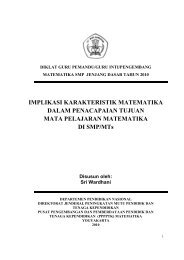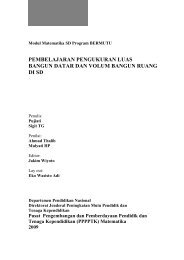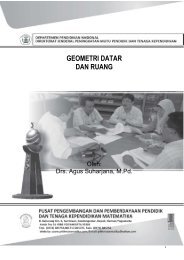- Page 3:
A tender rosebud on the verge of bl
- Page 6 and 7:
Contents Foreword . . . . . . . .
- Page 8 and 9:
Mistake 9: Deliberate Mistreatment
- Page 10 and 11:
Scenario 16.7: When the Bough Crack
- Page 12 and 13:
Foreword Anita Woolfolk Hoy The Ohi
- Page 14 and 15:
Preface to the Second Edition other
- Page 16:
About the Author Carolyn Orange, P
- Page 19 and 20:
2 25 Biggest Mistakes Teachers Make
- Page 21 and 22:
4 25 Biggest Mistakes Teachers Make
- Page 24:
1 DISCIPLINE
- Page 27 and 28:
10 Discipline on her. These extreme
- Page 29 and 30:
12 Discipline student another chanc
- Page 31 and 32:
14 Discipline SCENARIO 1.7 Water Sp
- Page 33 and 34:
16 Discipline know how to disciplin
- Page 35 and 36:
18 Discipline The worst experience
- Page 37 and 38:
20 Discipline SCENARIO 1.19 Biting
- Page 39 and 40:
22 Discipline The teacher was not m
- Page 41 and 42:
24 Discipline harassment that could
- Page 43 and 44:
26 Discipline likelihood that undes
- Page 45 and 46:
28 Discipline SCENARIO 2.2 Pit Bull
- Page 47 and 48:
30 Discipline SCENARIOS 2.5 and 2.6
- Page 49 and 50:
32 Discipline SCENARIO 2.9 Pupil Pl
- Page 51 and 52:
34 Mistake 3 Purposeful Alienation
- Page 53 and 54:
36 Discipline SCENARIO 4.2 Don’t
- Page 55 and 56:
38 Discipline SCENARIO 4.5 Old Scho
- Page 57 and 58:
40 Discipline Consummate profession
- Page 60 and 61:
Mistake 5 Favoritism SCENARIO 5.1
- Page 62 and 63:
Mistake 5: Favoritism said he recei
- Page 64 and 65:
Mistake 6 Physiological Discrimina
- Page 66 and 67:
Mistake 6: Physiological Discrimina
- Page 68 and 69:
Mistake 6: Physiological Discrimina
- Page 70 and 71:
Mistake 7 Personal Attacks SCENARI
- Page 72 and 73:
Mistake 7: Personal Attacks The dic
- Page 74 and 75:
Mistake 8 Inappropriate Teacher-St
- Page 76 and 77:
Mistake 8: Inappropriate Teacher-St
- Page 78 and 79:
Mistake 9: Deliberate Mistreatment
- Page 80 and 81:
Mistake 10 Racial and Cultural Dis
- Page 82 and 83:
Mistake 10: Racial and Cultural Dis
- Page 84 and 85:
Mistake 10: Racial and Cultural Dis
- Page 86 and 87:
Mistake 10: Racial and Cultural Dis
- Page 88 and 89:
Mistake 11 Humiliation SCENARIO 11
- Page 90 and 91:
Mistake 11: Humiliation what the co
- Page 92:
Mistake 11: Humiliation SCENARIO 11
- Page 96 and 97:
Mistake 12 Inappropriate Classroom
- Page 98 and 99:
Mistake 12: Inappropriate Classroom
- Page 100 and 101:
Mistake 12: Inappropriate Classroom
- Page 102 and 103:
Mistake 12: Inappropriate Classroom
- Page 104 and 105:
Mistake 12: Inappropriate Classroom
- Page 106 and 107:
Mistake 12: Inappropriate Classroom
- Page 108 and 109:
Mistake 12: Inappropriate Classroom
- Page 110 and 111:
Mistake 12: Inappropriate Classroom
- Page 112 and 113:
Mistake 13: Inappropriate Toileting
- Page 114 and 115:
Mistake 13: Inappropriate Toileting
- Page 116 and 117:
Mistake 13: Inappropriate Toileting
- Page 118:
Mistake 13: Inappropriate Toileting
- Page 122 and 123:
Mistake 14 Inappropriate Education
- Page 124 and 125:
Mistake 14: Inappropriate Education
- Page 126 and 127:
Mistake 14: Inappropriate Education
- Page 128 and 129:
Mistake 14: Inappropriate Education
- Page 130 and 131:
Mistake 14: Inappropriate Education
- Page 132 and 133:
Mistake 14: Inappropriate Education
- Page 134 and 135:
Mistake 14: Inappropriate Education
- Page 136 and 137:
Mistake 14: Inappropriate Education
- Page 138 and 139:
Mistake 14: Inappropriate Education
- Page 140 and 141:
Mistake 15: Inappropriate Assessmen
- Page 142 and 143:
Mistake 15: Inappropriate Assessmen
- Page 144 and 145: Mistake 15: Inappropriate Assessmen
- Page 146: 5 PERSONALITY AND PROFESSIONALISM
- Page 149 and 150: 132 Personality and Professionalism
- Page 151 and 152: 134 Personality and Professionalism
- Page 153 and 154: 136 Personality and Professionalism
- Page 155 and 156: 138 Personality and Professionalism
- Page 157 and 158: 140 Personality and Professionalism
- Page 159 and 160: 142 Personality and Professionalism
- Page 161 and 162: 144 Personality and Professionalism
- Page 163 and 164: 146 Personality and Professionalism
- Page 165 and 166: 148 Personality and Professionalism
- Page 167 and 168: 150 Mistake 18 Poor Administration
- Page 169 and 170: 152 Mistake 19 Teacher Reputation
- Page 171 and 172: 154 Mistake 20 Teacher Misjudgment
- Page 173 and 174: 156 Personality and Professionalism
- Page 175 and 176: 158 Personality and Professionalism
- Page 177 and 178: 160 Personality and Professionalism
- Page 180 and 181: Mistake 21 Teacher Bias or Expecta
- Page 182 and 183: Mistake 21: Teacher Bias or Expecta
- Page 184 and 185: Mistake 21: Teacher Bias or Expecta
- Page 186 and 187: Mistake 22: Unethical Behavior In b
- Page 188 and 189: Mistake 22: Unethical Behavior The
- Page 190 and 191: Mistake 22: Unethical Behavior The
- Page 192 and 193: Mistake 23 False Accusations SCENA
- Page 196 and 197: Mistake 24: Inappropriate Reactions
- Page 198 and 199: Mistake 24: Inappropriate Reactions
- Page 200 and 201: Mistake 24: Inappropriate Reactions
- Page 202 and 203: Mistake 25: Sexual Harassment (Hust
- Page 204 and 205: Mistake 25: Sexual Harassment proba
- Page 206: 7 TEACHER CONFESSIONS OF WORST TRE
- Page 209 and 210: 192 25 Biggest Mistakes Teachers Ma
- Page 211 and 212: 194 25 Biggest Mistakes Teachers Ma
- Page 213 and 214: 196 25 Biggest Mistakes Teachers Ma
- Page 215 and 216: 198 25 Biggest Mistakes Teachers Ma
- Page 217 and 218: 200 25 Biggest Mistakes Teachers Ma
- Page 219 and 220: 202 25 Biggest Mistakes Teachers Ma
- Page 221 and 222: 204 25 Biggest Mistakes Teachers Ma
- Page 223 and 224: 206 25 Biggest Mistakes Teachers Ma
- Page 225 and 226: 208 25 Biggest Mistakes Teachers Ma
- Page 227 and 228: 210 25 Biggest Mistakes Teachers Ma
- Page 229 and 230: 212 25 Biggest Mistakes Teachers Ma
- Page 231 and 232: 214 25 Biggest Mistakes Teachers Ma
- Page 233 and 234: 216 25 Biggest Mistakes Teachers Ma
- Page 235 and 236: 218 25 Biggest Mistakes Teachers Ma
- Page 237 and 238: 220 25 Biggest Mistakes Teachers Ma
- Page 239 and 240: 222 25 Biggest Mistakes Teachers Ma
- Page 241 and 242: 224 25 Biggest Mistakes Teachers Ma
- Page 243 and 244: 226 25 Biggest Mistakes Teachers Ma
- Page 245 and 246:
228 25 Biggest Mistakes Teachers Ma
- Page 247 and 248:
230 25 Biggest Mistakes Teachers Ma
- Page 249 and 250:
232 25 Biggest Mistakes Teachers Ma
- Page 251 and 252:
234 25 Biggest Mistakes Teachers Ma
- Page 253 and 254:
236 25 Biggest Mistakes Teachers Ma
- Page 255 and 256:
238 25 Biggest Mistakes Teachers Ma
- Page 257 and 258:
240 25 Biggest Mistakes Teachers Ma
- Page 259 and 260:
Figure 7.1 A Social Interaction Mod
- Page 261 and 262:
244 25 Biggest Mistakes Teachers Ma
- Page 263 and 264:
246 25 Biggest Mistakes Teachers Ma
- Page 265 and 266:
248 25 Biggest Mistakes Teachers Ma
- Page 267 and 268:
250 25 Biggest Mistakes Teachers Ma
- Page 269 and 270:
252 25 Biggest Mistakes Teachers Ma
- Page 271 and 272:
A fter 254 Epilogue examining and
- Page 273 and 274:
256 25 Biggest Mistakes Teachers Ma
- Page 275 and 276:
258 25 Biggest Mistakes Teachers Ma
- Page 277 and 278:
Abandonment by teacher, 172-173, 18
- Page 279 and 280:
262 25 Biggest Mistakes Teachers Ma
- Page 281 and 282:
264 25 Biggest Mistakes Teachers Ma
- Page 283 and 284:
266 25 Biggest Mistakes Teachers Ma
- Page 285:
268 25 Biggest Mistakes Teachers Ma





